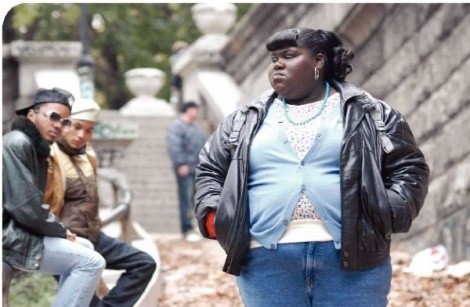
I’m mystified, because I’m not sure how a story like the one that unfolds in Precious can be anything other than the harrowing, heartbreaking, explicit work that it is.
How do we tell a story about the worst that a girl’s experience can be—raped by her father; emotionally and physically abused by her mother; denigrated or ignored by almost everyone around her, to the point where she has no hope and nothing to live for—if we’re not up-front about it? Nothing that we see is unbelievable, unless one wants to deny the hell that some women go through because of the color of their skin, their gender or the low expectations everyone has for them. Are we not supposed to tell some stories because they’re too uncomfortable, or because we don’t want to acknowledge the reality of them, or precisely because they spring from racism, sexism and classism?
The “hysterical” really rankles, because that’s traditionally been a word used to dismiss women’s experiences. But it’s hard not to heed 1987 Harlem resident Precious, because she’s so genuine, in her pain and in her misery and in the strength that she doesn’t even realize she has. Her real name is Claireece Jones, but everyone calls her by her middle name, Precious—which is a cruel joke, since no one appears to care one whit for her until she begins attending the “alternative” school Each One Teach One, where her teacher (Paula Patton) is kind to her. That kindness seems like something out of a fairy tale after what we’ve seen of Precious’s life to that point, rife with dismal everyday horrors as it is.
This isn’t movie-of-the-week stuff, with a plucky heroine and a happy ending. It is not sentimental, and nothing about it is sugar-coated. That would be the stuff of liberal guilt, if it attempted to assuage us—that all the terrible things that can happen aren’t so bad after all, because the human spirit can nevertheless triumph over it. Precious has spirit, but if there’s anything triumphant about how her story ends, it’s a very small, very survivalminded sort of triumph.
None of those horrors, however, makes Precious anything less than real. The culture she is steeped in may drive her, say, to see a pretty blonde girl instead of her own self when she looks in the mirror, or to want a boyfriend who is “light-skinned,” but are those not honest reactions to everything she sees around her, everything she is subjected to? A more supportive, more loving environment may have given her the resources she needed to be able to reject the BS her culture has foisted on her, but when the nicest thing her mother, Mary (Mo’Nique, ferociously terrific), can call her is “dumb bitch,” shouldn’t we be surprised that Precious is able to muster what meager resources she can?
Transgressing boundaries deemed appropriate is typically what got women labeled “hysterical” in the past, and I wonder if the same dynamic is not at work here. Director Lee Daniels—working from an adaptation by Geoffrey Fletcher—dares to give us a sympathetic heroine in Precious, even though she is obese, very dark-skinned, and massively depressed. Gabourey Sidibe is not a cover girl playing “ugly”; that’s what Mariah Carey does here, frumped up as a social worker. Carey’s performance is fine, but the gimmick of it is a tad distracting. Sidibe is a real woman, and a real actor portraying a character.
It disheartens me, but does not surprise me, that so many can fail to see even that meta-aspect of this frank and unembellished film. The full breadth of what constitutes authentic womanhood is so unseen on film—from Hollywood studios and independent filmmakers alike—that when something like Precious comes along and falls outside the constricted standard, it isn’t even recognized for what it is.
City Weekly’s Scott Renshaw will lead an audience Q&A and panel discussion after the Friday, Nov. 20, 7:15 p.m. showtime of Precious at the Broadway Theater.
PRECIOUS: BASED ON THE NOVEL ‘PUSH’ BY SAPPHIRE
![]()
Gaboury Sidibe, Mo’Nique, Paula Patton
Rated R
